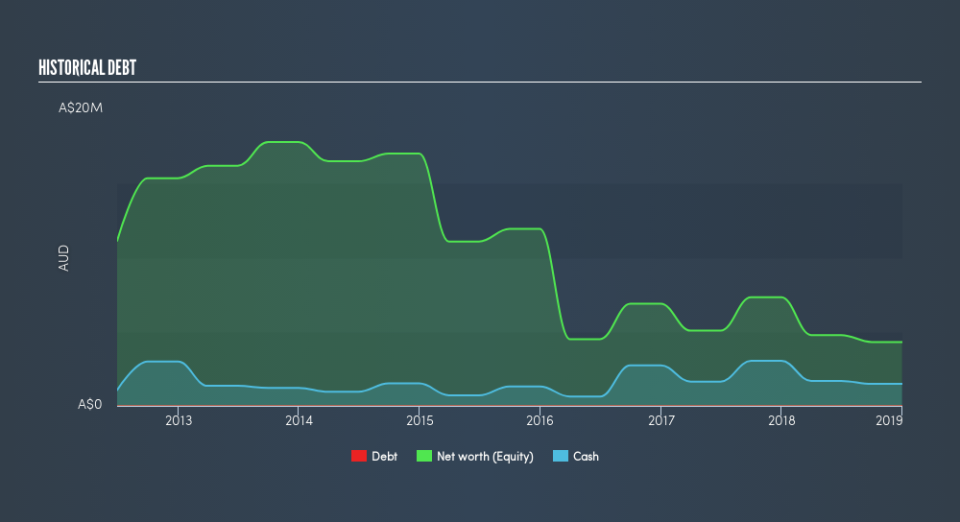Those Who Purchased Predictive Discovery (ASX:PDI) Shares Five Years Ago Have A 92% Loss To Show For It

We're definitely into long term investing, but some companies are simply bad investments over any time frame. We don't wish catastrophic capital loss on anyone. Spare a thought for those who held Predictive Discovery Limited (ASX:PDI) for five whole years - as the share price tanked 92%. And we doubt long term believers are the only worried holders, since the stock price has declined 71% over the last twelve months. There was little comfort for shareholders in the last week as the price declined a further 25%.
We really feel for shareholders in this scenario. It's a good reminder of the importance of diversification, and it's worth keeping in mind there's more to life than money, anyway.
Check out our latest analysis for Predictive Discovery
With just AU$22,004 worth of revenue in twelve months, we don't think the market considers Predictive Discovery to have proven its business plan. We can't help wondering why it's publicly listed so early in its journey. Are venture capitalists not interested? As a result, we think it's unlikely shareholders are paying much attention to current revenue, but rather speculating on growth in the years to come. For example, investors may be hoping that Predictive Discovery finds some valuable resources, before it runs out of money.
Companies that lack both meaningful revenue and profits are usually considered high risk. You should be aware that there is always a chance that this sort of company will need to issue more shares to raise money to continue pursuing its business plan. While some companies like this go on to deliver on their plan, making good money for shareholders, many end in painful losses and eventual de-listing. Predictive Discovery has already given some investors a taste of the bitter losses that high risk investing can cause.
Predictive Discovery had net cash of just AU$1.4m when it last reported (December 2018). So if it has not already moved to replenish reserves, we think the near-term chances of a capital raising event are pretty high. With that in mind, you can understand why the share price dropped 40% per year, over 5 years. The image below shows how Predictive Discovery's balance sheet has changed over time; if you want to see the precise values, simply click on the image.
In reality it's hard to have much certainty when valuing a business that has neither revenue or profit. Would it bother you if insiders were selling the stock? It would bother me, that's for sure. It costs nothing but a moment of your time to see if we are picking up on any insider selling.
What about the Total Shareholder Return (TSR)?
We'd be remiss not to mention the difference between Predictive Discovery's total shareholder return (TSR) and its share price return. The TSR is a return calculation that accounts for the value of cash dividends (assuming that any dividend received was reinvested) and the calculated value of any discounted capital raisings and spin-offs. We note that Predictive Discovery's TSR, at -89% is higher than its share price return of -92%. When you consider it hasn't been paying a dividend, this data suggests shareholders have benefitted from a spin-off, or had the opportunity to acquire attractively priced shares in a discounted capital raising.
A Different Perspective
Investors in Predictive Discovery had a tough year, with a total loss of 71%, against a market gain of about 12%. Even the share prices of good stocks drop sometimes, but we want to see improvements in the fundamental metrics of a business, before getting too interested. Unfortunately, last year's performance may indicate unresolved challenges, given that it was worse than the annualised loss of 36% over the last half decade. Generally speaking long term share price weakness can be a bad sign, though contrarian investors might want to research the stock in hope of a turnaround. If you would like to research Predictive Discovery in more detail then you might want to take a look at whether insiders have been buying or selling shares in the company.
Of course Predictive Discovery may not be the best stock to buy. So you may wish to see this free collection of growth stocks.
Please note, the market returns quoted in this article reflect the market weighted average returns of stocks that currently trade on AU exchanges.
We aim to bring you long-term focused research analysis driven by fundamental data. Note that our analysis may not factor in the latest price-sensitive company announcements or qualitative material.
If you spot an error that warrants correction, please contact the editor at editorial-team@simplywallst.com. This article by Simply Wall St is general in nature. It does not constitute a recommendation to buy or sell any stock, and does not take account of your objectives, or your financial situation. Simply Wall St has no position in the stocks mentioned. Thank you for reading.

